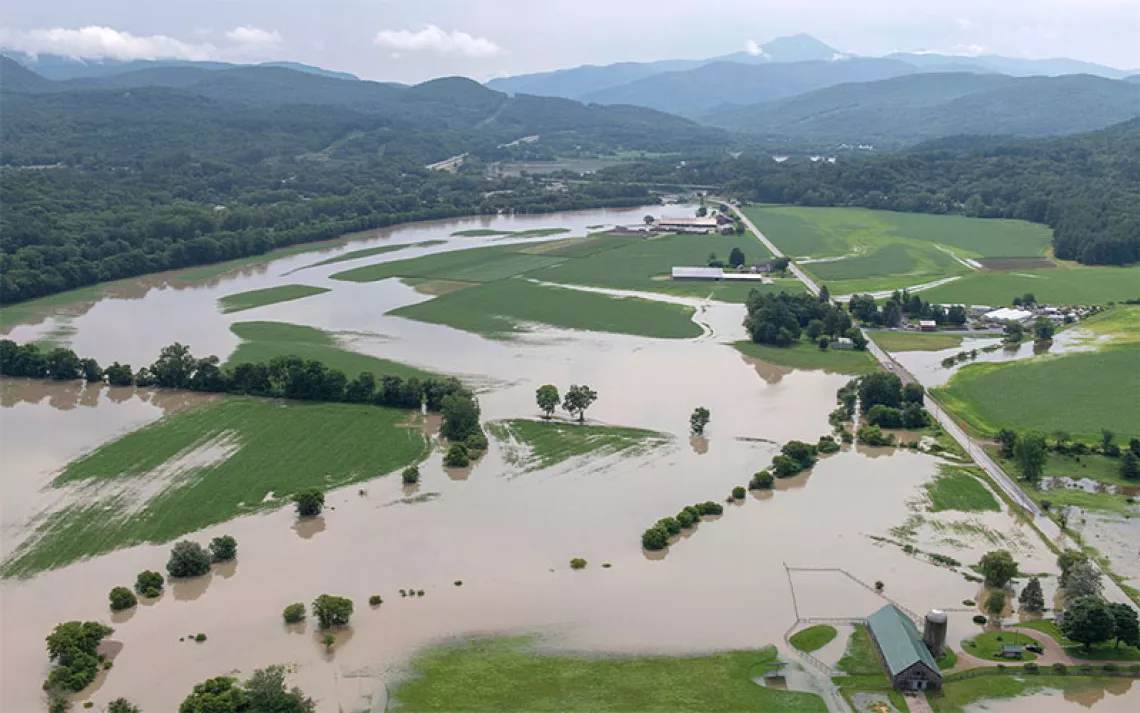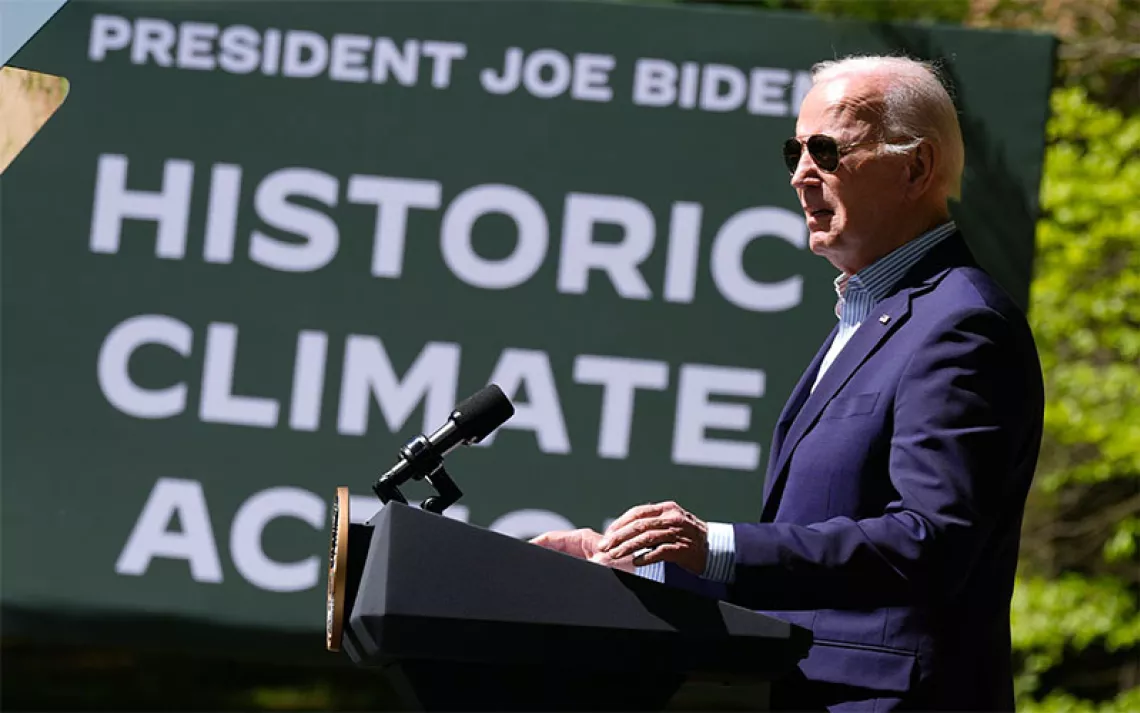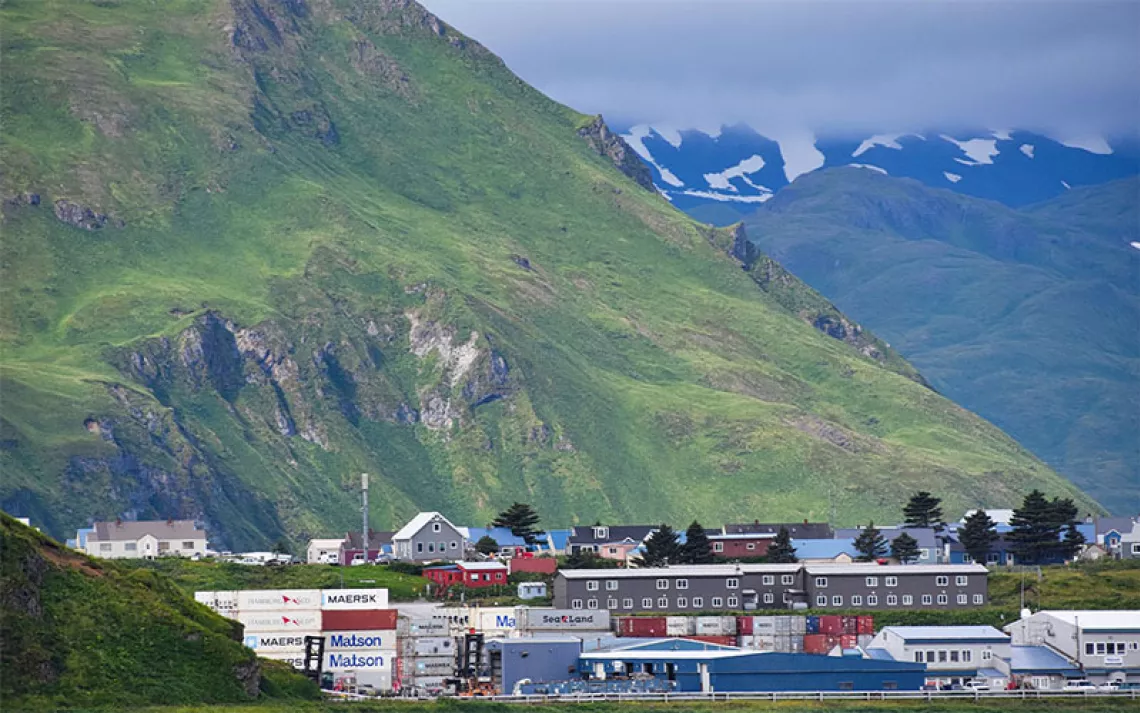Ugandan Women Didn't Cause Climate Change, But They're Adapting to It
How a network of women are weathering the changing climate
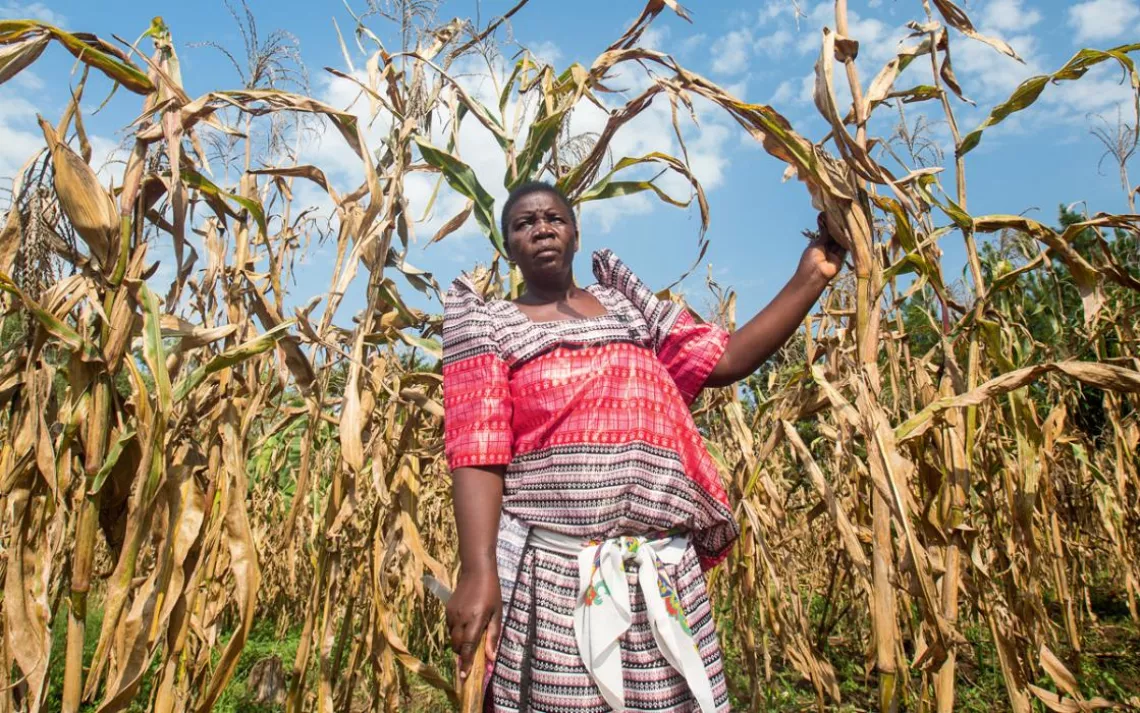
Constance Okollet leads climate change education campaigns via the Osukuru United Women Network in Uganda. | Photos by Edward Echwalu
PEOPLE IN OSUKURU, Uganda, say that climate change arrived in 2007. That spring, it rained without stopping. Floods washed away houses, crops, and livestock. By April, hundreds of the newly homeless had taken shelter in a community hall, which was growing increasingly squalid. Alarmed, government officials sent a group of local volunteers trained in public health to visit the hall and talk about basic sanitation.
Among those who came to help was a tall, soft-spoken woman named Constance Okollet. She was stunned by the devastation that the storms had brought to her neighbors, who had always been poor but self-sufficient. They had relied on the predictable rhythm of the rainy and dry seasons to grow maize, sorghum, and millet to feed their families and livestock. They had sold the surplus at the market to pay their children's school fees.
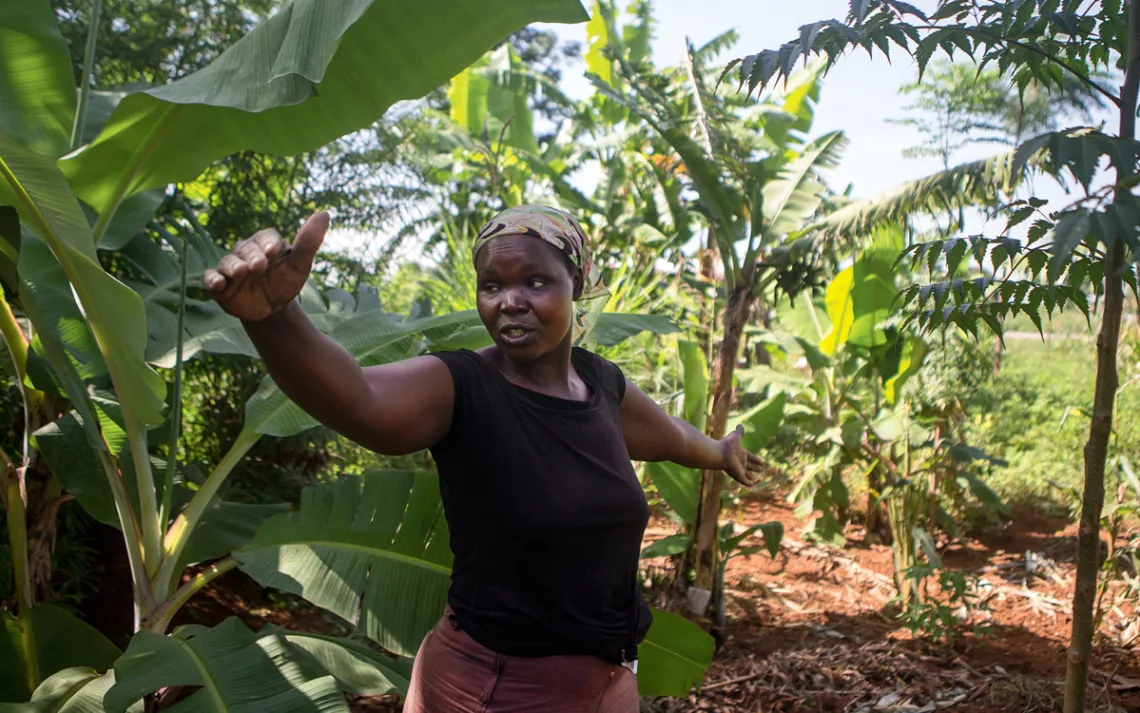
Irene Barbara Amayo started a poultry farm in Uganda.
Now the weather was unpredictable, and the floods had left many people destitute. After visiting the hall, Okollet and other community leaders met to discuss what to do. Was God punishing them? they wondered. Uganda is a deeply Christian country—nearly half the people are Protestant; another 40 percent are Catholic. Maybe, the group thought, this suffering was part of God's plan.
The government had provided only a little aid in response to the crisis, and few NGOs were operating here in the southeastern corner of the country. Okollet suggested that the neighbors form a group to help one another. They agreed and immediately elected Okollet as the chairperson. The focus, they decided, should be on improving the lives of women. As the primary caretakers of children, women had to grapple the most with food insecurity. Someone proposed that they call themselves the Osukuru United Women Network.
The organization's first objective was to encourage women to pool their savings, no matter how minimal. Savings groups met weekly and regularly selected a different member to receive a small loan, which she could use to replace household items lost in the storms or maybe to buy medicine for a sick child.
Over time, the network has evolved into something else: a large-scale effort to educate locals about climate change and to offer training in mitigation and adaptation strategies.
Climate change is hitting Uganda hard. Models used in the Intergovernmental Panel on Climate Change's Fifth Assessment Report show rising temperatures and increasingly erratic rainfall over the next several decades. Sixty-nine percent of the country's population depends on subsistence farming, which means that when their crops fail, residents have no alternative food supply. With over 40 groups and nearly 1,300 members, the Osukuru United Women Network is a model of grassroots climate adaptation. It would not have happened without Okollet.
CONSTANCE OKOLLET WAS BORN IN 1964 in Kisoko, not far from Osukuru. Her father was an engineer. During school holidays, he brought the family to neighboring countries where he was building bridges and roads, an experience that left her with a facility for navigating other languages and cultures. All nine children—seven girls and two boys—received at least a high school education, which was unusual at the time, especially for girls. At age 19, she married Stephen Okollet, an English and literature teacher at a local high school, and went to live with him at his family's sprawling compound in Asinget village, in Osukuru subcounty.
Women in rural Uganda typically do not become community leaders, and Okollet did not aspire to be one. She was busy raising her first four children and tending to the garden and the kitchen. But in 1991, a position opened up on the board of a nonprofit that ran a local school. Her husband and her father-in-law encouraged her to fill it, and she ended up serving as the chairperson for the next 12 years. In 2004, she volunteered for a government-run health education program and began traveling regularly to villages throughout the area. Taking on these leadership roles was intimidating at first, but also satisfying. "It is something that widens your brain," Okollet says, "instead of thinking only about how to blow the fire, how to cook, how to fetch the water. You meet different people; you hear their problems."
In spring 2009, Okollet heard on the radio that an NGO called Oxfam would be holding a meeting in the nearby town of Tororo about food insecurity in the area. She decided to go. It had been another bad year, with a drought followed by too much rain and more disastrous floods. The Okollets' latrine and kitchen had both been swept away, and they had lost their cows. "Things were all going in the wrong direction," Okollet says. "There was no food."
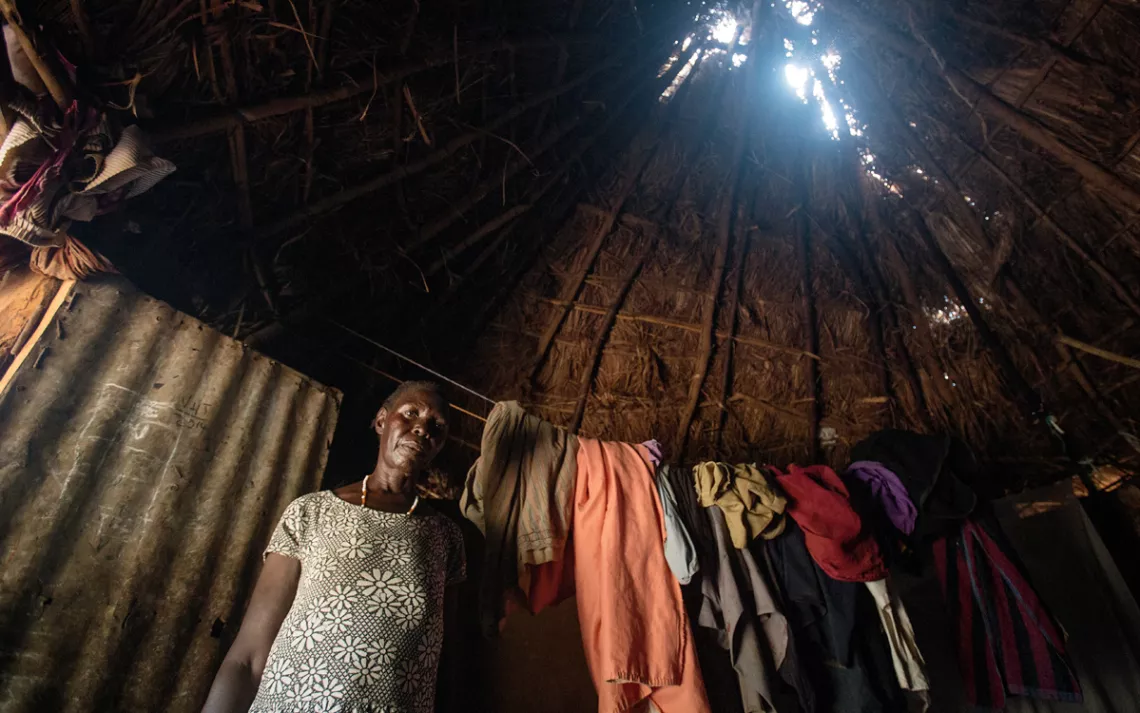
Holes in the roof of village huts are commonplace. The grass used to repair them is a casualty of changing weather.
At the Oxfam meeting, Okollet vividly described the suffering she had witnessed. A week later, an Oxfam representative called and asked if she could come to another meeting in Kampala, about 130 miles west of Tororo.
There, Okollet remembers, the organizers "were talking about climate change, climate change, climate change."
"I said, 'But what is this climate change?'" Someone told her that industrialized countries had put so much pollution into the atmosphere that it was changing the weather.
Okollet was devastated. "Why do they do this to us?" she wondered.
But she also felt hope. God wasn't punishing her community after all. If climate change was caused by humans, it could be stopped. "Can we talk to these people?" she asked. "Can't they reduce the pollution?"
A few weeks later, Oxfam called again. Would Okollet be willing to come to London to share her story?
On the plane, Okollet couldn't stop looking out the window. She had never been on a plane before or even seen one up close. In London, she was fascinated with street-sweeping machines and the way that doors, lights, and faucets operated automatically.
The first speech was terrifying. She didn't know how to handle the microphone. But she continued giving speeches, including one to parliamentarians from around the world, and she grew more confident as she saw that audiences were moved by her account. Pushpanath Krishnamurthy, an Oxfam campaigner at the time, watched her presentations in London. "She was a natural," he says. "Her speeches were so eloquent and emotional."
The trip to London made her wonder who she really was. She had always thought of herself as a peasant, but now she had addressed a room full of dignitaries. When her husband met her at the airport after she returned home, he asked, "Is that you, Constance, who is coming in from London?" And they both laughed.
Since then, Okollet has spoken at the UN climate change conferences in Copenhagen, Durban, Cancun, Paris, and Marrakech. In 2010 and 2011, she toured the United States and Europe with Climate Wise Women, a group that helps women living on the front lines of climate change tell their stories. She has met government officials from around the world and has lobbied Congress on Capitol Hill. "She speaks truth to power, but she doesn't blame people," Krishnamurthy says. "She says, 'Let's do this together.'"
Okollet keeps talking about climate change at home, too, explaining its causes and telling people that they are not helpless in the face of it. At first, members of the Osukuru United Women Network were incredulous, but now few believe that climate change is God's punishment. It's a problem caused by humans, they say, one that they might overcome if they work together.
ON A WARM AFTERNOON IN JUNE, Irene Barbara Amayo stands in the courtyard of her family home, banging a pot with a spoon. Eighty young chickens stream in from the surrounding fields, crowding into a small shed like excited schoolchildren. "They know I will feed them," she says.
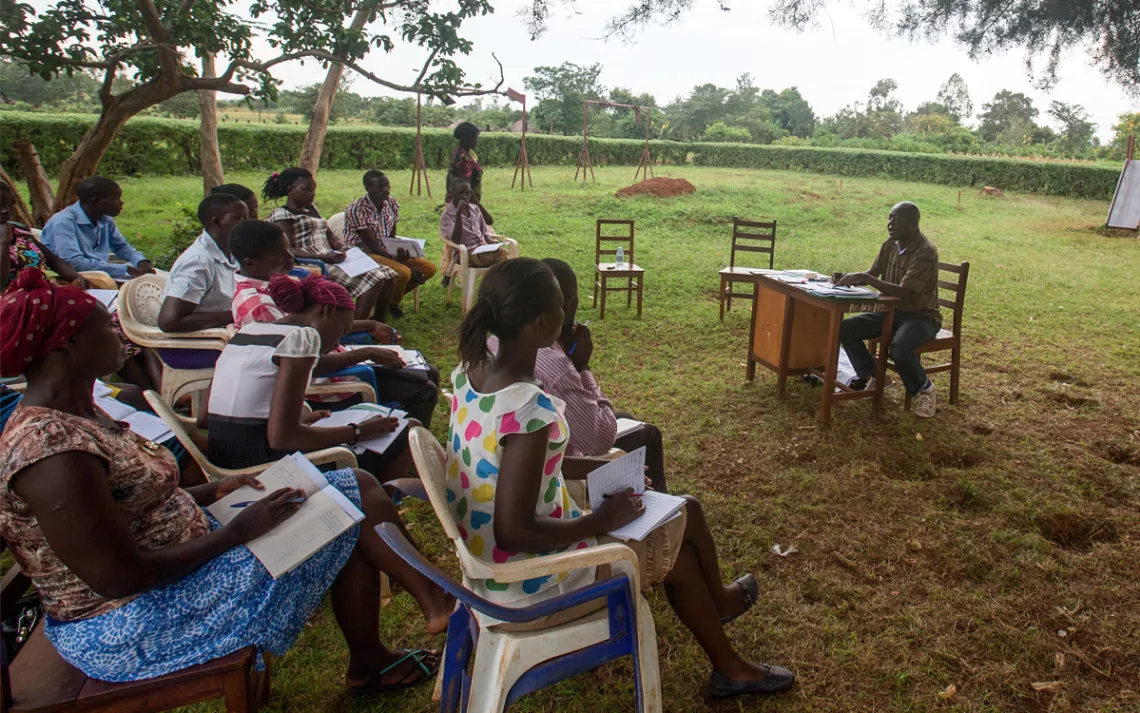
Stephen Okollet teaches an accounting class to a group of volunteers in Uganda.
Amayo is the chairperson of a group in the Osukuru United Women Network. It has 15 core members—mostly women and a few men (while the organization is largely made up of women, men are encouraged to participate). The compound where Amayo lives with her husband and four young children is not far off the paved road that runs from Tororo to Kampala. On either side of the two-lane highway, agricultural fields and clusters of grass-thatched huts, along with the occasional brick house, stretch to the distant hills. They are crisscrossed by a maze of red-dirt roads.
Amayo and her group bought the chickens last February. Learning how to care for the birds has involved some painful trial and error. In March, Amayo and her husband bought feed that had been bulked up with rice husks, and over half the birds died. Now when they can afford it, they buy the ingredients separately and mix the feed themselves. When they can't, they offer the chickens sorghum from their meager store. In about a month's time, the birds will start producing eggs that the couple can eat and sell in the market. Eventually, they'll breed the chickens so that other group members can start their own poultry farms.
Amayo got the idea for the poultry farm at a weeklong training conducted by the Green Belt Movement, which works with women in rural Kenya to help them start small businesses and manage farmland and natural resources more sustainably. Okollet met the founder of the movement, Nobel Peace Prize winner Wangari Maathai, early in her travels, and the two struck up a correspondence. Maathai passed away in 2011, but her organization stayed in touch and eventually arranged to bring 60 members of the Osukuru United Women Network to its headquarters in Nairobi.
At the training, network members learned how to make and sell charcoal briquettes, which is how Amayo and her group funded the poultry operation. "They told us, 'Don't wait to be given capital,'" Amayo says. "'You must get your own capital.'"
She and the rest of her group buy charcoal dust for next to nothing. Then they mix it with handfuls of the ubiquitous red dirt, add water, and shape the paste into small round balls, which they place in the shade to dry. The briquettes replace firewood as a source of fuel, which means the women chop down fewer trees (deforestation is rampant in Uganda and exacerbates flooding) and have fewer respiratory problems from standing over smoky fires.
The group has also started a small tree nursery. The women gather at Amayo's home to plant seedlings, using circular labels peeled off empty liquor bottles as containers. They pack them with dirt and burrow the delicate roots inside. Eventually, they hope, the rows of makeshift pots that sit in the speckled shade at the edge of the property will be another profitable business.
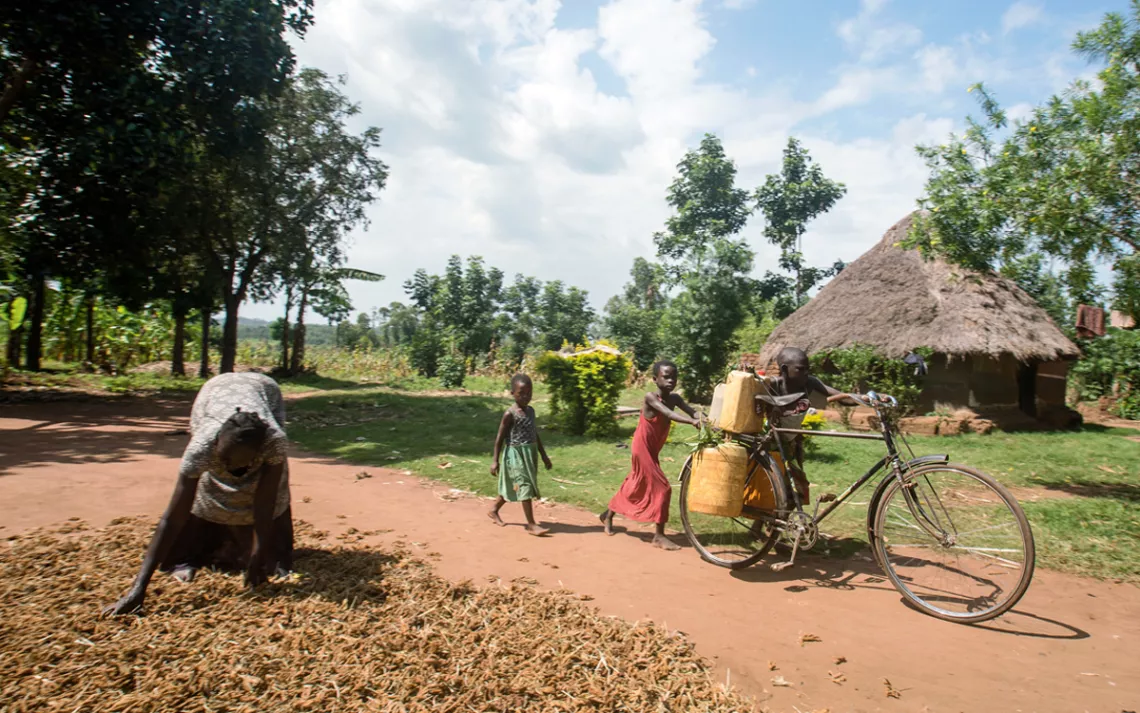
Frequent droughts have increased the distance villagers have to walk to get water in Uganda.
Once they've earned enough capital, group members can move on to more ambitious projects that will further buffer them and their families from food insecurity. They can install rainwater tanks around their compounds to serve as a hedge against drought.
They can buy an ox plow, which will enable them to plant crops faster, while good weather lasts. "When you just go digging with the hand hoe, you don't dig enough," Amayo says, "but if we had that ox plow, it can plough an acre in a day. Food can be timed."
Since the Green Belt Movement training, network members are now all growing kitchen gardens—small plots of green, leafy vegetables that can be watered with discarded dishwater. "Kitchen gardens aren't a new idea, but they are not really appreciated," says Paul Thiongo, the project officer who helped train the Osukuru group. Traditionally—and, until recently, legally—only men have owned land in Uganda, and they decide what to plant. "Men tend to choose crops like maize that they can grow for commercial purposes and then use the money they earn to buy vegetables," Thiongo says. "We want women to save that money."
Kitchen gardens provide the obvious benefit of combating malnutrition, but they also serve as a means to start redistributing resources more equitably. "When famine comes, the men go out and leave you with the children," Amayo says. "When you have something that you own, you feel secure. Your husband will not shout at you, because you are somebody responsible. If he wants to use that thing, he will ask you for permission. If there is a problem, you work together to solve it."
Even though the border with Kenya is only about 10 miles east of Osukuru, the Green Belt Movement training was the first time most of the participants had been out of the country. In Nairobi, they saw a different world. They visited a female farmer who manages to be self-sufficient on one acre of land by turning her potatoes into chips and selling them and by keeping beehives that she harvests for honey.
Justine Anyango, the treasurer for the Osukuru United Women Network, also attended the training. Things had never been easy for her, but in 2009, a bad storm had destroyed her house. The roof of her brother's house had collapsed, killing him and leaving her with five orphans to care for, along with her own children. The week in Nairobi made her think that life could be about more than just enduring. "I questioned myself: 'How do people get money?'" She was struck by one group they visited who owned a bakery and transported their goods by motorcycle to surrounding markets. "Those women were older than us but very healthy and strong. When we came back, I said, 'I think I'm old, but I am not old. I can still change my life.'"
The training also included basic accounting lessons. Since then, a Canadian accountant who lives part-time in Kampala has continued to train network members. This, too, has opened up new ways of thinking. Record keeping can reveal, for example, that it might be better to buy a lower-grade flour that sells for less if you are able to sell it faster than a higher-grade flour that sells for more. "Things have become difficult, and one needs to take whatever one has and take very good care of it, make sure that it pays," says Stephen, Okollet's husband. On Saturday afternoons, he teaches an accounting class to a group of 20 college-age volunteers, with the idea that they will travel in pairs throughout the area to mentor members who have started businesses.
A sense of urgency infuses all of these efforts, as the women contend with the reality that they and their families can no longer rely on subsistence farming. If they are to survive, they must reenvision who they are and what they are capable of. Thiongo says that the 60 members of the network who attended the Green Belt Movement training will be agents of change for the whole group and the entire area, and he credits Okollet for being the catalyst. "She is a very good mobilizer. She's so passionate about empowering these communities. Now they have the knowledge."
But the setbacks have been constant. Groups that pooled their money to buy livestock lost much of it in a crippling drought that began in May 2016 and lasted for a year. Crops fared poorly, and hunger was widespread. Some people resorted to picking and eating premature cassava, which is toxic when harvested too early and can be deadly. The grass used to make thatched roofs has disappeared, and many homes in Osukuru have gaping holes in the ceilings that would have been simple to repair just a few years ago.
The drought brought other hazards, too. One day, Lucy Achieng Kizito, a group leader, was in the kitchen preparing food when she saw a black cloud of smoke descending on her compound. Fire had spread rapidly across the dry thicket behind the village, and the huts where she and her family slept and stored surplus food burned down. Disasters like this are commonplace now, and it takes families years to recover from them.
Members of the Osukuru United Women Network struggle with more mundane challenges as well, like managing a large, sprawling organization without the benefit of computers, the internet, or even electricity. They communicate by word of mouth or with cellphones that can be charged for a small fee at roadside stands. Villages beyond Osukuru are clamoring to join the network, but it's hard to reach them. No one owns a vehicle. Trainers must rely on what passes for public transportation: packed minivans or the dangerous but efficient boda bodas (motorcycles) that zip around on the main road. Funds for transportation are always lacking. In a small commercial district on the edge of Tororo, a building sits in mid-construction. Someday, it will house an office, if the network can save enough money to finish it.
STEPHEN WAS LISTENING on his shortwave radio when President Donald Trump announced last June that his administration was pulling out of the Paris climate accord. It was the middle of the night in Uganda, but he woke Constance up to tell her. She wept and couldn't sleep for the rest of the night.
She is fundamentally an optimist, though, and thinks that President Trump will change his mind. People like her will go to him, she says, and explain. "He is a human being. Even if it doesn't affect him, it will affect the children. He will understand."
Okollet knows something about changing minds. When she first started speaking at conferences in 2009, audience members from more-prosperous nations "would listen and say 'sorry.'" Now they stand up and talk about how climate change is impacting them, too.
"With our talking, things will change slowly, slowly. We shall have our normal lives that we used to have, the food, year in, year out. The children will eat."
"Talk," she says. "It's a process."
This article appeared in the November/December 2017 edition with the headline "The Mobilizers."
MORE
See photos and learn more about members of the Osukuru United Women Network: sc.org/osukuru.
Watch a video of Irene Barbara Amayo and her group planting seedlings for their tree nursery: sc.org/amayo.
Read about the invasive armyworm destroying Uganda’s cereal crops: sc.org/armyworm.
 The Magazine of The Sierra Club
The Magazine of The Sierra Club

